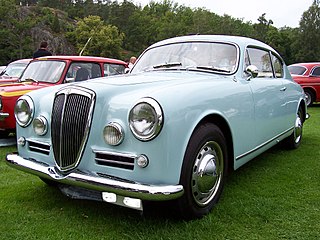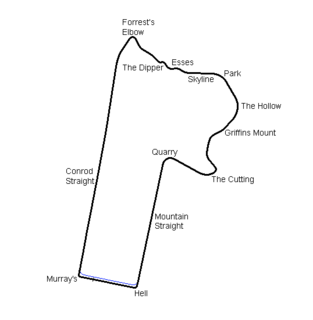Schedule

The championship was contested over a seven race series. [1] Overall winner race winners are shown in bold.
| 1966 Trans-Am Series | |||
| Previous: | none | Next: | 1967 |
The 1966 Trans-American Sedan Championship was the inaugural running of the Sports Car Club of America's Trans-Am Series auto racing series. It was open to FIA Group 1 and FIA Group 2 cars and was contested over seven races. [1] Manufacturers titles were awarded for both Over 2 Liter and Under 2 Liter cars with Ford and Alfa Romeo winning their respective class championships. [1] Horst Kwech and Gaston Andrey were subsequently named Drivers Co-Champions in 1980 when the SCCA retroactively named drivers championships for the series after the 1980 season.

The championship was contested over a seven race series. [1] Overall winner race winners are shown in bold.
The Dodge Dart of Bob Tullius won the Over 2 liter class at the opening race at Sebring International Raceway, while the Alfa Romeo GTA of Formula One driver Jochen Rindt won the Under 2 liter class and was placed first overall. [1]
Over the course of the championship Ford Mustangs won the Over 2 liter class at four races with Dodge Darts winning twice and Plymouth Barracuda once. [1] Alfa Romeo GTAs won the Under 2 liter class at five races with Ford Cortina Lotus winning twice. [1] Ford and Alfa Romeo won their respective class championships. [1]
Points were awarded according to finishing position. [1] Only the highest-placed car scored points for the manufacturer. [1] Drivers' championships were not awarded in Trans-Am until 1972.
| 1st | 2nd | 3rd | 4th | 5th | 6th |
|---|---|---|---|---|---|
| 9 | 6 | 4 | 3 | 2 | 1 |
| Pos [1] | Manufacturer [1] | Seb | MAR | Bry | VIR | Mar | GRV | RIV | Pts [1] |
|---|---|---|---|---|---|---|---|---|---|
| 1 | Ford | 5 | 1 | 2 | 1 | 5 | 1 | 1 | 46 |
| 2 | Chrysler-Plymouth | 2 | 2 | 1 | 3 | 2 | 2 | 5 | 39 |
| 3 | Dodge | 1 | 5 | 4 | 1 | 3 | 2 | 33 | |
| 4 | Chevrolet | 4 | 3 | ||||||
| [1] | |||||||||
| Pos [1] | Manufacturer [1] | Seb | MAR | Bry | VIR | Mar | GRV | RIV | Pts [1] |
|---|---|---|---|---|---|---|---|---|---|
| 1 | Alfa Romeo | 1 | 1 | 2 | 1 | 1 | 1 | 2 | 57 |
| 2 | Ford of Britain | 2 | 1 | 2 | 2 | 1 | 36 | ||
| 3 | BMW | 6 | 4 | 4 | |||||
| 4 | BMC | 4 | 3 | ||||||
| 5 | Volvo | 5 | 2 | ||||||
| 6 | Fiat Abarth | 6 | 1 | ||||||
| [1] | |||||||||
The following models scored championship points for their respective manufacturers.

A grand tourer (GT) is a type of sports car that is designed for high speed and long-distance driving, due to a combination of performance and luxury attributes. The most common format is a front-engine, rear-wheel-drive two-door coupé with either a two-seat or a 2+2 arrangement. Grand tourers are most often the coupé derivative of luxury saloons.
The International Motor Sports Association (IMSA) is a North American sports car racing sanctioning body based in Daytona Beach, Florida under the jurisdiction of the ACCUS arm of the FIA. It was started by John Bishop, a former executive director of SCCA, and his wife Peggy in 1969 with help from Bill France Sr. of NASCAR. Beginning in 2014, IMSA is the sanctioning body of the WeatherTech SportsCar Championship, the premier series resulting from the merger of Grand-Am Road Racing and the American Le Mans Series. IMSA is owned by NASCAR, as a division of the company.

The Kwik Fit British Touring Car Championship is a touring car racing series held each year in the United Kingdom, currently organised and administered by TOCA. It was established in 1958 as the British Saloon Car Championship and was renamed as the British Touring Car Championship for the 1987 season. The championship, currently running Next Generation Touring Car regulations, has been run to various national and international regulations over the years including FIA Group 2, FIA Group 5, FIA Group 1, FIA Group A, FIA Super Touring and FIA Super 2000. A lower-key Group N class for production cars ran from 2000 until 2003.

The Alfa Romeo GTA is a coupé automobile manufactured by the Italian manufacturer Alfa Romeo from 1965 to 1971. It was made for racing (Corsa) and road use (Stradale).
The European Touring Car Championship was an international touring car racing series organised by the FIA. It had two incarnations, the first one between 1963 and 1988, and the second between 2000 and 2004. In 2005 it was superseded by the World Touring Car Championship, and replaced by the European Touring Car Cup between 2005 and 2017 when became also defunct.
The 1971 International Championship for Makes season was the 19th season of FIA World Sportscar Championship motor racing. It was open to Group 6 Sports Prototypes, Group 5 Sportscars, and Group 4 Special GT Cars and was contested over an eleven race series which ran from 10 January to 24 July 1971. Porsche won the championship, and the German manufacturer also won the International Cup for GT Cars.

During its history, Alfa Romeo has competed successfully in many different categories of motorsport, including Grand Prix motor racing, Formula One, sportscar racing, touring car racing and rallies. They have competed both as a constructor and an engine supplier, via works entries and private entries. The first racing car was made in 1913, three years after the foundation of A.L.F.A., the 40-60HP had 6 liter straight-4 engine. Alfa Romeo quickly gained a good name in motorsport and gave a sporty image to the whole marque.
The International GT Open is a grand tourer-style sports car racing series founded in 2006 by the Spanish GT Sport Organización. It was a spin-off of the now-defunct Spanish GT Championship, but is now a distinct series featuring FIA GT3-spec cars modified from production road cars.

The 1967 Gallaher 500 was a motor race for Production Saloon Cars held at the Mount Panorama Circuit just outside Bathurst in New South Wales, Australia on 1 October 1967. The race, which was the eighth running of the Phillip Island 500/Bathurst 500, was organised by the Australian Racing Drivers Club Ltd and promoted by Gallaher International (Aust) Ltd.

John Fitzpatrick is a former English racing driver, winning many titles throughout his career. He works within motorsport as a consultant doing corporate events and driver management. He published a book "Fitz-My Life at the Wheel" in 2016.
The Sportscar Vintage Racing Association (SVRA) is an American automobile club and sanctioning body that supports vintage racing in the United States. The organization was founded in 1981, and is regarded as the premier vintage racing organization in the U.S.
Horst Kwech was an Australian race car driver, race car constructor, engineer and inventor known primarily for his several wins in the early Trans-Am Series races of the 1960s and the beginning of the 1970s.
This article documents the events that occurred in motorsports in the 1960s.
The 1968 Trans-American Championship was the third running of the Sports Car Club of America's Trans-Am Series. 1968 marked the addition of the 12 Hours of Sebring and the 24 Hours of Daytona, the only year that the Trans-Am Series featured those races. The season also marked the first time that an event was held outside of the United States, when a race at Mont-Tremblant brought Trans-Am into Quebec, Canada.
The 1969 Trans-American Championship was the fourth running of the Sports Car Club of America's Trans-Am Series. The championship was open to SCCA Sedan category cars competing in Over 2 liter and Under 2 liter classes. 1969 marked the end of the use of co-drivers in the Trans-Am Championship, as most of the races were between 2.5 and 3 hours. The Over 2 liter and Under 2 liter Manufacturers' titles were won by Chevrolet and Porsche respectively.
The 1970 Trans-American Championship was a motor racing series organised by the Sports Car Club of America for SCCA Sedans. It was the fifth Trans-Am Championship. Ford and still potent Alfa Romeo won the Over 2 Litre and Under 2 Litre titles respectively.
SCCA Pro Racing is the pro racing division of the Sports Car Club of America. SCCA Pro Racing was formed in 1963, the company is a fully owned subsidiary of SCCA.

The FIA World Touring Car Cup is an international touring car championship promoted by Eurosport Events and sanctioned by the Fédération Internationale de l'Automobile (FIA). It has had different incarnation of a World Touring Car Cup held between 1993 and 1995. Following the 2017 season, an agreement was reached for the World Touring Car Championship to become WTCR and use the TCR technical regulations. With titles for drivers and teams only, the WTCR series changed to 'World Cup' rather than 'World Championship' status in 2018.